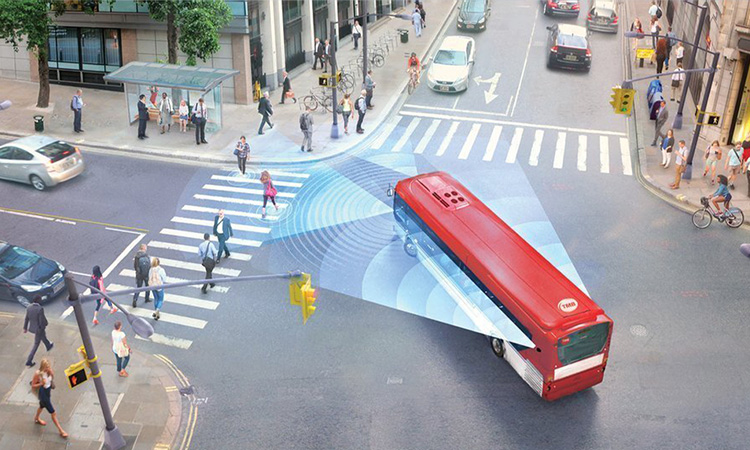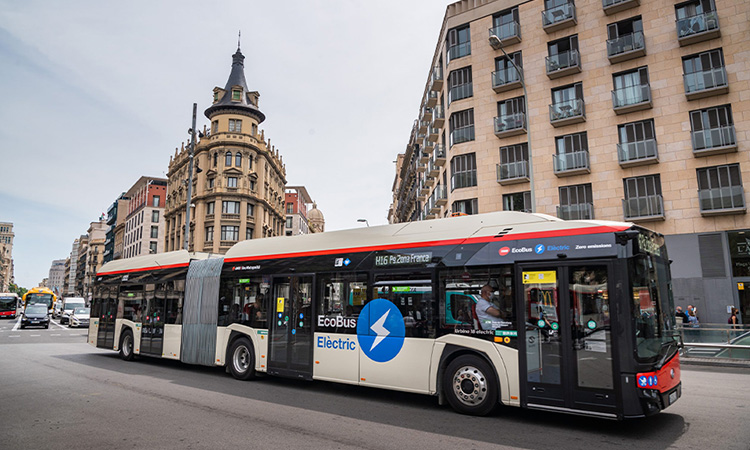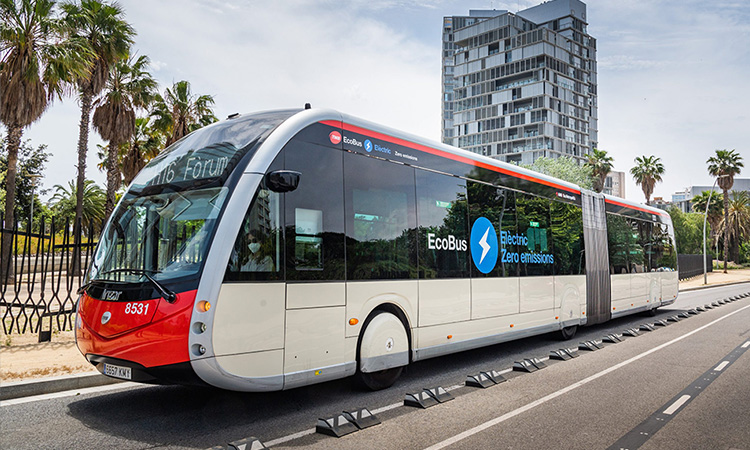Exploring TMB’s innovation strategy: Balancing sustainability and cost-effectiveness
- Like
- Digg
- Del
- Tumblr
- VKontakte
- Buffer
- Love This
- Odnoklassniki
- Meneame
- Blogger
- Amazon
- Yahoo Mail
- Gmail
- AOL
- Newsvine
- HackerNews
- Evernote
- MySpace
- Mail.ru
- Viadeo
- Line
- Comments
- Yummly
- SMS
- Viber
- Telegram
- Subscribe
- Skype
- Facebook Messenger
- Kakao
- LiveJournal
- Yammer
- Edgar
- Fintel
- Mix
- Instapaper
- Copy Link
Posted: 17 May 2023 | Margarida López Romero - Transports Metropolitans de Barcelona | No comments yet
One of Intelligent Transport’s newest Advisory Board Members, Margarida López Romero, discusses the role of artificial intelligence and big data analytics in shaping the future of transportation, and shares her insights on how public and private stakeholders can collaborate to foster innovation and deliver a more sustainable public transport network.


Credit: Transports Metropolitans de Barcelona
How do you define innovation at TMB?
We understand innovation at Transports Metropolitans de Barcelona (TMB) in a broad sense as any initiative that generates a new product, service or organisational model that adds value. This value does not have to be exclusively economic, but also in terms of social, environmental or corporate image value. In short, innovation must introduce some significant novelty that adds value to our company.
In short, innovation must introduce some significant novelty that adds value to our company”
Another key element is the adoption of this novelty; as a public company, we must be very rigorous with our services and the impact that they have on citizens and our employees. For this reason and following the phrase of the expert consultant in strategy, innovation and corporate entrepreneurship, Xavier Marcet: “Go twenty steps ahead is to be a pioneer, to be half a step ahead is to be innovative.”
Therefore, my job as Director of Innovation is to find that balance between continuous improvement and disruptive innovations that allow it to be easily adopted by our users and the organisation.
How does TMB balance the need for innovation with the need for cost-effectiveness and financial sustainability, particularly given the economic challenges facing the transport industry in recent years?
The balance is born from the complete alignment with this context. From the innovation area, we prioritise the projects that offer a gain in the effectiveness and efficiency of our services. Likewise, we use all of the financing mechanisms offered by Europe and national entities to be able to carry out innovations.
On the other hand, knowing that innovation has an inherent risk, we have implemented fast-prototyping methodology to validate proposals with minimum cost. In this way, the previous step to starting a pilot must be this validation of the acceptance of the proposal through a minimum viable product. If the results are not as expected, we pivot or cancel the project.
Does TMB engage with customers and other stakeholders in the innovation process, particularly in the co-creation of new products and services?
We have just started an initiative called Social Lab in which, for the first time, we carry out co-creation processes from the beginning with our users”
Yes, absolutely. We have just started an initiative called Social Lab in which, for the first time, we carry out co-creation processes from the beginning with our users. As a first step, three challenges were proposed, so that the users who belong to our JoTMBé relational marketing club could vote for the one that they were most interested in addressing. Once the challenge that we’d be working on is chosen, ideation workshops would start, both with employees and with citizens of different archetypes, that would address the problem. We are just at that stage now. Finally, solutions will be prioritised and a minimum viable product will be made, so that it can be tested in reality.
On the other hand, every year, we participate in various co-creation initiatives with middle school and university students, proposing challenges to be addressed with different innovation methodologies.


Credit: UITP
What role does digital transformation play in TMB’s innovation strategy, and how do you prioritise digital initiatives?
It is obvious that technology and digitalisation are key levers that are used in many innovative solutions, yet I always like to remember that there can be many innovations that do not go through technological adoptions.
The digital transformation, in any case, must be addressed by any company that wants to improve its competitiveness and guarantee its future survival. The key axes on which we have underpinned the digital transformation strategy at TMB are:
- Efficiency and effectiveness in a broad sense (economic, energetic, environmental, etc.) as a driving element
- Prior process simplification and resource optimisation as a basis for automation
- The connection with the client, placing them at the centre of the organisation’s decisions (user-centric strategy)
- Agility as the operating principle of the adoption of digital culture from a global point of view
- The orientation to the data (data-driven company) as a strategy for making decisions based on the analysis and interpretation of data
- Innovation as a lever to ensure the goals and benefits of future projects
- The preparation of the organisation (people, processes and technology) to adapt to the new needs.
Does TMB ensure that its innovation projects align with its broader sustainability goals, particularly in terms of climate neutrality?
Of course; I have a very close relationship with our Corporate Social Responsibility Director, whose area has led our new sustainability plan, which is totally aligned with our Sustainable Development Goals (SDGs).
If we focus in the minimisation of environmental impact, our principal aims are to:
- Reduce the impact of the TMB network activity in terms of pollution, and establish measures to minimise the impact on climate change
- Progressively increase the use of the best available technologies and the most environmentally friendly fuels – decarbonisation of the fleet
- Promote the circular economy and prevent and manage waste
- Make sustainable use of resources
- Use electricity from the metro network to charge buses, achieving cost savings (bus-metro electrical infrastructure synergy).
We completely link innovation proposals with sustainability challenges, which is evident in the large projects that have been launched by TMB, including:
- The adoption and testing of hydrogen buses
- Participation in the project of the first green hydrogen plant for public use in Spain
- The Metro energy efficiency plan, which includes innovative artificial intelligence (AI) projects for the management of the ventilation of the facilities (RESPIRA project)
- The Metrocharge braking energy recovery project, which allows the recovery of unused energy that is dissipated in the form of heat in the braking process.


Credit: UITP
The goal is that, by the end of 2024, TMB’s fleet of standard and articulated vehicles will consist only of 100% zero-emission vehicles, which currently makes up 75% of our fleet”
Electrification is, in fact, the main axis of the plan to renovate and environmentally update urban buses in Barcelona and the metropolitan area, which is one of the key aims of TMB’s 2025 Strategic Plan. As part of our plan, we aim to incorporate more than 500 electric, compressed natural gas (CNG) and hydrogen vehicles between 2022 and 2025, as well as the necessary infrastructure works to supply them with green energy. The goal is that, by the end of 2024, TMB’s fleet of standard and articulated vehicles will consist only of 100% zero-emission vehicles, which currently makes up 75% of our fleet.
In addition, TMB is participating in a circular economy project that will allow it to put into circulation a bus that is powered by biomethane, a fuel obtained from treated sludge and wastewater. The biomethane used will come from the production plant that had recently been inaugurated at the Ecofactoria del Baix Llobregat, and which, under the tutelage of the LIFE NIMBUS European project consortium, aims to promote more sustainable transport based on the circular economy. It is expected that this fuel will reduce the carbon footprint by more than 85% thanks to its high quality and its renewable nature, neutral in emissions.
How does TMB plan to increase the representation of women in the transport industry, particularly in decision-making positions, and what programmes are in place to support this goal?
At TMB… the implementation of measures to raise awareness, feminise the sector, improve safety and the travel experience with a gender perspective are considered crucial”
At TMB, both for its impact on the lives of citizens and for being a company in a historically male-dominated sector, the implementation of measures to raise awareness, feminise the sector, improve safety and the travel experience with a gender perspective are considered crucial.
Currently, the organisation is made up of 6,707 men and 1,809 women, representing just over a fifth of the workforce (21.24% of the total). Taking these figures into account, the latest selection processes have integrated clauses to encourage the inclusion of women in the workforce. The most innovative measure implemented in this regard is the reservation of 40% of available positions for women in the recent selection process for bus drivers.
As a reinforcement of these personnel selection initiatives, the company’s employees have also contributed to the campaign by creating their own design, ‘If we are the same, we are better’, which aims to encourage more women to join the TMB project.
Furthermore, internship programmes and mentoring actions within the company (with the aim of identifying, capturing and retaining female talent) are also part of TMB’s strategic line.
That being said, our management committee is currently made up of six women out of 18 members (33%), so we must continue to improve our presence in senior management.
You have recently joined us as a new member of the Intelligent Transport Advisory Board. Why do you think it is important that the industry comes together to share knowledge and experience?
Intelligent Transport seems to me to be an ideal forum to carry out this exchange of knowledge, so I am very proud and grateful to be part of the Advisory Board”
As Innovation Director, I strongly believe in the ‘open innovation’ concept and the importance of being a part of ecosystems. It is vital that all of us who belong to the transport and mobility value chain share our experiences and learn from each other, with the clear intention of improving our products and services in the most efficient way possible.
In order for this to work, there must be forums where all of the information about successful cases, but also of those projects that may not have worked out, are shared honestly. Intelligent Transport seems to me to be an ideal forum to carry out this exchange of knowledge, so I am very proud and grateful to be part of the Advisory Board.


Related topics
Alternative Power, Artificial Intelligence, Passenger Experience, Public Transport, Staff & Skills Development, Sustainable Urban Transport
Related modes
Bus & Coach
Related cities
Barcelona
Related countries
Spain
Related organisations
Transports Metropolitans de Barcelona (TMB)
Related people
Margarida López Romero








